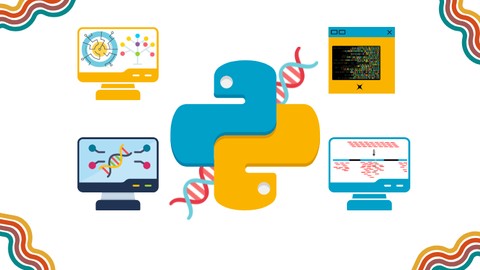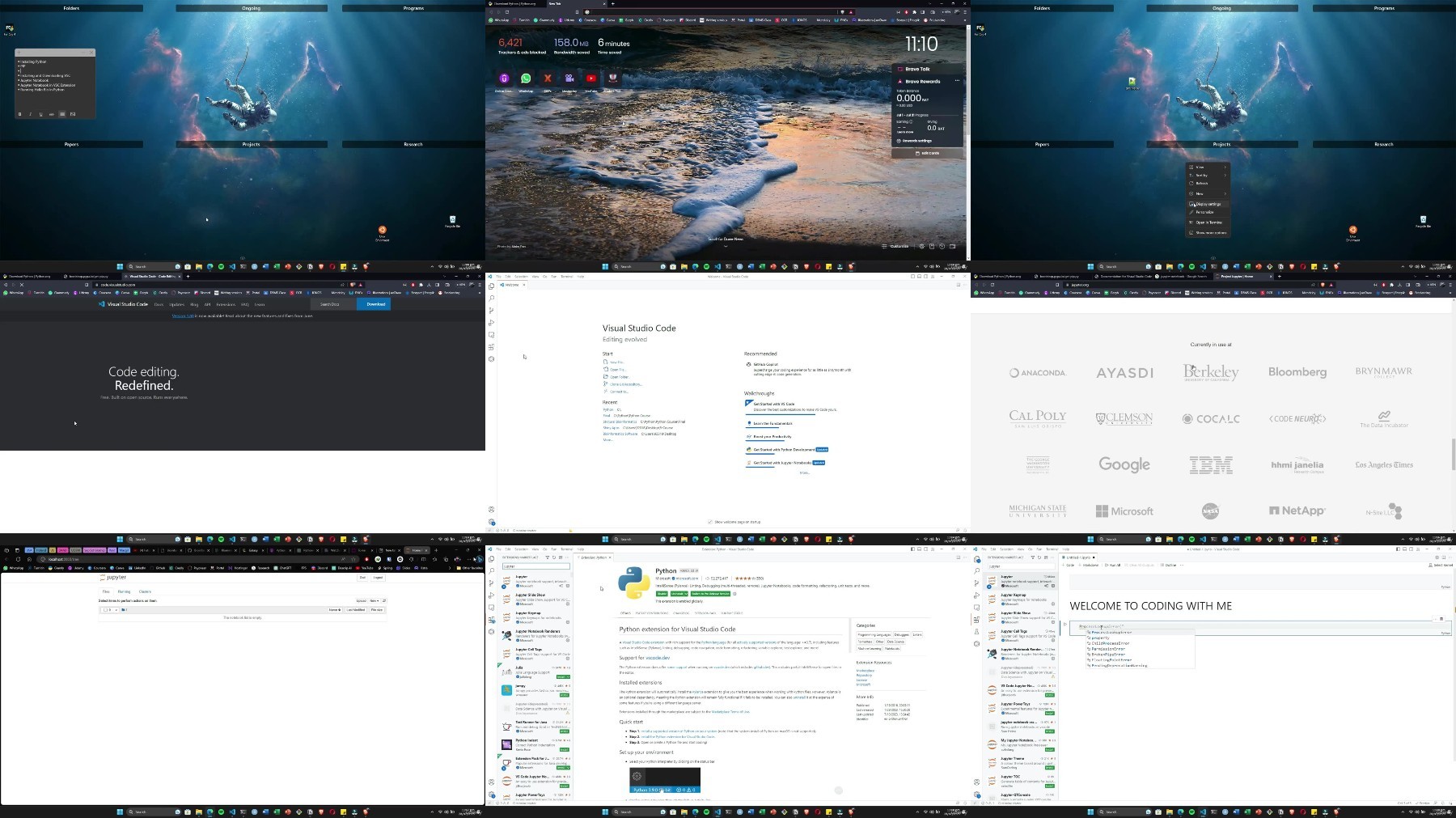Learn Advance Python For Bioinformatics Develop Desktop Apps

Learn Advance Python For Bioinformatics Develop Desktop Apps
Published 4/2024
MP4 | Video: h264, 1920x1080 | Audio: AAC, 44.1 KHz
Language: English
| Size: 1.80 GB[/center]
| Duration: 2h 38m
Master Python Programming for Bioinformatics and Develop Powerful Applications for Genome Analysis and Beyond
What you'll learn
Python Programming for Bioinformatics: Master Python programming concepts and techniques specifically tailored for bioinformatics applications.
Biological Programming Fundamentals: Understand the basics of biological programming, including how to manipulate biological data and perform common bioinformat
Coding Environment Setup: Learn how to set up a coding environment for Python, including installing and configuring necessary libraries and tools.
Sequence Alignment: Develop a sequence alignment tool to compare and align DNA or protein sequences, a fundamental task in bioinformatics.
Genome Annotation: Create a genome annotation tool to annotate genomes with information about gene structure, function, and regulation.
Phylogenetic Tree Construction: Construct phylogenetic trees to visualize evolutionary relationships between organisms, a key component of evolutionary biology
Variant Calling File (VCF) Analysis: Build variant separator tool to analyze variants identified in a variant calling file (VCF), essential for u
Requirements
Basic Python Knowledge: While not mandatory, having a basic understanding of Python programming will be beneficial.
Interest in Bioinformatics: A passion for biology and an interest in applying programming to biological data analysis.
Computer with Internet Access: Access to a computer with internet connectivity to participate in lectures and complete assignments.
Text Editor or IDE: A text editor or integrated development environment (IDE) for writing and running Python code.
Desire to Learn: A willingness to learn and explore new concepts in bioinformatics and programming.
Description
In this comprehensive course, you will master Python programming for bioinformatics and learn to develop powerful applications for genome analysis and beyond. Whether you're a beginner looking to enter the field of bioinformatics or an experienced professional seeking to enhance your skills, this course is designed to equip you with the knowledge and tools necessary to succeed.What's Included:Introduction To Biological Programming: Learn the fundamentals of biological programming and how Python is used in the field of bioinformatics.Setting Up Coding Environment for Python: Set up your coding environment for Python, including installing necessary libraries and tools.Creating Sequence Alignment Tool: Build a sequence alignment tool to compare and align DNA or protein sequences.Creating Genome Annotation Tool: Develop a tool for annotating genomes with information about gene structure, function, and regulation.Creating Phylogenetic Tree Constructor: Construct phylogenetic trees to visualize evolutionary relationships between organisms.Creating Variant separator for Variant Calling File (VCF): Build a variant separator tool to analyze variants identified in a variant calling file (VCF).The requirements or prerequisites for taking this course include:Basic Python Knowledge: While not mandatory, having a basic understanding of Python programming will be beneficial.Interest in Bioinformatics: A passion for biology and an interest in applying programming to biological data analysis.Computer with Internet Access: Access to a computer with internet connectivity to participate in lectures and complete assignments.Text Editor or IDE: A text editor or integrated development environment (IDE) for writing and running Python code.Desire to Learn: A willingness to learn and explore new concepts in bioinformatics and programming.By the end of this course, you'll be equipped with the skills and confidence to tackle complex bioinformatics challenges and contribute to cutting-edge research and innovation. Join us on this exciting journey into the intersection of biology and programming!
Overview
Section 1: Introduction
Lecture 1 Introduction To Biological Programming
Lecture 2 Powerhouse Trio of Bioinformatics
Lecture 3 Introduction to Bioinformatics Application Developemnt
Lecture 4 Python For Bioinformatics Application Developemnt
Section 2: Setting Up Coding Environment for Python
Lecture 5 Setting Up the Coding Environment
Lecture 6 How to Install Python and Pip
Lecture 7 How to Install VSC
Lecture 8 How to Install Jupyter Notebook
Lecture 9 How to Install biopython Library Using Pip
Section 3: Creating Sequence Alignment Tool
Lecture 10 Introduction to Sequence Alignment and its Algorithms
Lecture 11 Code for Sequence Alignment Tool
Lecture 12 Testing and Creating Exe File of Alignment Tool
Lecture 13 Commands for Creating Exe File of Alignment Tool
Section 4: Creating Genome Annotation Tool
Lecture 14 Introduction to Genome Annotation
Lecture 15 Code for Genome Annotation Tool
Lecture 16 Testing and Creating Exe File of Genome Annotation Tool
Section 5: Creating Phylogenetic Tree Constructor
Lecture 17 Introduction to Phytogenetics and Trees Constructing Algorithms
Lecture 18 Code for Phylogenetic Tree Constructor
Lecture 19 Testing and Running Phylogenetic Tree Constructor
Section 6: Creating Variant Streator for Variant Calling File (VCF)
Lecture 20 Introduction to Variant Calling
Lecture 21 Code for Variant Seperator
Lecture 22 Testing and Creating Exe file of Variant Seperator
Beginners in Bioinformatics: Those new to bioinformatics who want to learn Python programming for biological data analysis.,Biologists: Biologists who want to expand their skills in computational analysis of biological data.,Programmers: Programmers who want to specialize in bioinformatics and genomic data analysis.,Students: Students studying biology, bioinformatics, computer science, or related fields who want to complement their academic studies with practical skills.,Professionals: Professionals working in the fields of biology, genetics, or bioinformatics who want to advance their career by learning Python programming for biological data analysis.

https://voltupload.com/ih1xrwfeo6jw/Learn_Advance_Python_for_Bioinformatics_Develop_Desktop_Apps.z01
https://voltupload.com/6wuuffixqo9y/Learn_Advance_Python_for_Bioinformatics_Develop_Desktop_Apps.zip
https://rapidgator.net/file/a49158f18486c26501247f3371e8bdc9/Learn_Advance_Python_for_Bioinformatics_Develop_Desktop_Apps.z01
https://rapidgator.net/file/0c06ada194942c7fb9f9d46a9319718c/Learn_Advance_Python_for_Bioinformatics_Develop_Desktop_Apps.zip
Free search engine download: Learn Advance Python for Bioinformatics Develop Desktop Apps
